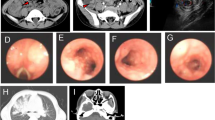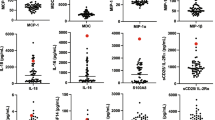Abstract
Purpose
Tumor necrosis factor alpha-induced protein 3 (TNFAIP3, A20) is a negative regulator of the nuclear factor-κB (NF-κB) pathway. It has recently been recognized that TNFAIP3 deficiency leads to early onset of autoinflammatory and autoimmune syndrome resembling Behçet’s disease. Here, we report a novel mutation in TNFAIP3 in a Chinese patient, who had Behçet-like phenotype and persistent Epstein-Barr virus (EBV) viremia.
Methods
The clinical data were collected. Immunological function was detected. Gene mutation was detected by whole-exome sequencing (WES) and confirmed by Sanger sequencing. mRNA and protein levels were detected in the patient under lipopolysaccharide (LPS) stimulation by real-time PCR and Western blot.
Results
The patient is a 13-year-old boy, presenting with intermittent fever for 5 months, who also experienced diffuse lymphadenopathy, arthritis, and recurrent multiple gastrointestinal ulcers. EBV DNA was detected in the serum and peripheral blood mononuclear cells of the patient. The immunological phenotype showed increased proportion of double-negative T cells (CD3+CD4−CD8−). A novel missense mutation (c.1428G > A) locating at the zinc fingers 2 (ZF2) domain of TNFAIP3 inherited from his mother was confirmed. Compared with age-matched healthy controls, decrease expression of A20 was observed in the patient. The NF-κB pathway was found to be overactivated, and the synthesis of TNF-α was upregulated in the patient-derived cells. However, cells from the mother showed a milder response to LPS than cells from the patient.
Conclusions
The present research indicated that the TNFAIP3 mutation of c.1428G > A (p.M476I) leads to the reduced suppression of NF-κB activation and accounted for the autoinflammatory phenotype and persistent EBV viremia in the patient.




Similar content being viewed by others
References
Kastner DL, Aksentijevich I, Goldbachmansky R. Autoinflammatory disease reloaded: a clinical perspective. Cell. 2010;140(6):784–90.
Jesus AAD, Goldbach-Mansky R. Monogenic autoinflammatory diseases: concept and clinical manifestations. Clin Immunol. 2013;147(3):155–74.
Russo RAG, Brogan PA. Monogenic autoinflammatory diseases. Rheumatology. 2014;53(11):1927–39.
Baltimore D. NF-κB is 25. Nat Immunol. 2011;12(8):683–5.
Rui L, Schmitz R, Ceribelli M, Staudt LM. Malignant pirates of the immune system. Nat Immunol. 2011;12(10):933–40.
Wertz IE, O'Rourke KM, Zhou H, Eby M, Aravind L, Seshagiri S, et al. De-ubiquitination and ubiquitin ligase domains of A20 downregulate NF-B signalling. Nature. 2004;430(7000):694–9.
David LBDL, Emre ETEE, Eric GLEG, R-C RCA, Matthew TWMT, Colleen TC, et al. The ubiquitin-modifying enzyme A20 is required for termination of Toll-like receptor responses. Nat Immunol. 5:1052–60 Nature Immunology. 2005;6(1):114.
Hitotsumatsu O, Ahmad RC, Tavares R, Wang M, Philpott D, Turer EE, et al. The ubiquitin-editing enzyme A20 restricts nucleotide-binding oligomerization domain containing 2-triggered signals. Immunity. 2008;28(3):381–90.
Jäättelä M, Mouritzen H, Elling F, Bastholm L. A20 zinc finger protein inhibits TNF and IL-1 signaling. J Immunol. 1996;156(3):1166–73.
Lee EG, Boone DL, Chai S, Libby SL, Chien M, Lodolce JP, et al. Failure to regulate TNF-induced NF-κB and cell death responses in A20-deficient mice. Science. 2000;289(5488):2350–4.
Musone SL, Taylor KE, Nititham J, Chu C, Poon A, Liao W, et al. Sequencing of TNFAIP3 and association of variants with multiple autoimmune diseases. Genes Immun. 2011;12(3):176–82.
Lee YH, Bae SC, Choi SJ, Ji JD, Song GG. Associations between TNFAIP3 gene polymorphisms and rheumatoid arthritis: a meta-analysis. Inflamm Res. 2012;61(6):635–41.
Zhu L, Wang L, Wang X, Zhou L, Liao Z, Xu L, et al. Characteristics of A20 gene polymorphisms and clinical significance in patients with rheumatoid arthritis. J Transl Med. 2015;13(1):215.
Musone SL, Taylor KE, Lu TT, Nititham J, Ferreira RC, Ortmann W, et al. Multiple polymorphisms in the TNFAIP3 region are independently associated with systemic lupus erythematosus. Nat Genet. 2008;40(9):1062–4.
Elsby LM, Orozco G, Denton J, Worthington J, Ray DW, Donn RP. Functional evaluation of TNFAIP3 (A20) in rheumatoid arthritis. Clin Exp Rheumatol. 2010;28(5):708–14.
Fung EY, Smyth DJ, Howson JM, Cooper JD, Walker NM, Stevens H, et al. Analysis of 17 autoimmune disease-associated variants in type 1 diabetes identifies 6q23/TNFAIP3 as a susceptibility locus. Genes Immun. 2009;10(2):188–91.
Eyre S, Hinks A, Bowes J, Flynn E, Martin P, Wilson AG, et al. Overlapping genetic susceptibility variants between three autoimmune disorders: rheumatoid arthritis, type 1 diabetes and coeliac disease. Arthritis Res Ther, 12,5(2010-09-20). 2010;12(5):R175-R.
Burton PR, Clayton DG, Cardon LR, Craddock N, Deloukas P, Duncanson A, et al. Genome-wide association study of 14,000 cases of seven common diseases and 3,000 shared controls. Nature. 2007;447(7145):661–78.
Zhou Q, Wang H, Schwartz DM, Stoffels M, Park YH, Zhang Y, et al. Loss-of-function mutations in TNFAIP3 leading to A20 haploinsufficiency cause an early-onset autoinflammatory disease. Nat Genet. 2016;48(1):67–73.
Duncan CJA, Dinnigan E, Theobald R, Grainger A, Skelton AJ, Hussain R, et al. Early-onset autoimmune disease due to a heterozygous loss-of-function mutation in TNFAIP3 (A20). Ann Rheum Dis. 2017. https://doi.org/10.1136/annrheumdis-2016-210944.
Ohnishi H, Kawamoto N, Seishima M, Ohara O, Fukao T. A Japanese family case with juvenile onset Behçet’s disease caused by TNFAIP3 mutation. Allergol Int. 2017;66(1):146–8.
Tomonari S, Naoe K, Norimoto K, Keiko K, Yusuke T, Naoko N, et al. Novel heterozygous C243Y A20/TNFAIP3 gene mutation is responsible for chronic inflammation in autosomal-dominant Behçet’s disease. RMD Open. 2016;2(1):e000223.
Takagi M, Ogata S, Ueno H, Yoshida K, Yeh T, Hoshino A, et al. Haploinsufficiency of TNFAIP3 (A20) by germline mutation is involved in autoimmune lymphoproliferative syndrome. J Allergy Clin Immunol. 2017;139(6):1914–22.
Sun J, Ying W, Liu D, Hui X, Yu Y, Wang J, et al. Clinical and genetic features of 5 Chinese patients with X-linked lymphoproliferative syndrome. Scand J Immunol. 2013;78(5):463–7.
Livak KJ, Schmittgen TD. Analysis of relative gene expression data using real-time quantitative PCR and the 2(-Delta Delta C(T)) method. Methods. 2001;25(4):402–8.
Hayden MS, Ghosh S. Signaling to NF-kappaB. Genes Dev. 2004;18(18):2195–224.
Hymowitz SG, Wertz IE. A20: from ubiquitin editing to tumour suppression. Nat Rev Cancer. 2010;10(5):332–41.
Catrysse L, Vereecke L, Beyaert R, Van LG. A20 in inflammation and autoimmunity. Trends Immunol. 2014;35(1):22–31.
Song HY, Rothe M, Goeddel DV. The tumor necrosis factor-inducible zinc finger protein A20 interacts with TRAF1/TRAF2 and inhibits NF-kappaB activation. Proc Natl Acad Sci U S A. 1996;93(13):6721–5.
Ma A, Malynn BA. A20: linking a complex regulator of ubiquitylation to immunity and human disease. Nat Rev Immunol. 2012;12(11):774–85.
Kadowaki T, Ohnishi H, Kawamoto N, Hori T, Nishimura K, Kobayashi C, et al. Haploinsufficiency of A20 causes autoinflammatory and autoimmune disorders. J Allergy Clin Immunol. 2018;141(4):1485–8.
Nomoto J, Hiramoto N, Kato M, Sanada M, Maeshima AM, Taniguchi H, et al. Deletion of the TNFAIP3/A20 gene detected by FICTION analysis in classical Hodgkin lymphoma. BMC Cancer, 12,1(2012-10-05). 2012;12(1):457.
Kato M, Sanada M, Kato I, Sato Y, Takita J, Takeuchi K, et al. Frequent inactivation of A20 in B-cell lymphomas. Nature. 2009;459(7247):712–6.
Ando M, Sato Y, Takata K, Nomoto J, Nakamura S, Ohshima K, et al. A20 (TNFAIP3) deletion in Epstein-Barr virus-associated lymphoproliferative disorders/lymphomas. PLoS One. 2013;8(2):e56741.
Acknowledgments
This study was supported by the National Natural Science Foundation of China (81471482), the Science and Technology Commission of Shanghai Municipality (14411965400), the Shanghai Hospital Development Center (SHDC12016228), and Children’s Hospital of Fudan University Funding (EK1125180110, EK112520180202). Many thanks to the patient and his parents.
Author information
Authors and Affiliations
Corresponding authors
Ethics declarations
Conflict of Interest
The authors declare that they have no conflict of interest.
Additional information
Publisher’s Note
Springer Nature remains neutral with regard to jurisdictional claims in published maps and institutional affiliations.
Rights and permissions
About this article
Cite this article
Dong, X., Liu, L., Wang, Y. et al. Novel Heterogeneous Mutation of TNFAIP3 in a Chinese Patient with Behçet-Like Phenotype and Persistent EBV Viremia. J Clin Immunol 39, 188–194 (2019). https://doi.org/10.1007/s10875-019-00604-9
Received:
Accepted:
Published:
Issue Date:
DOI: https://doi.org/10.1007/s10875-019-00604-9




